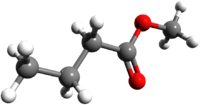Methyl butyrate
 | |
 | |
| Names | |
|---|---|
| Preferred IUPAC name
Methyl butanoate | |
| Other names
Butanoic acid methyl ester Methyl butyrate Butyric acid methyl ester | |
| Identifiers | |
| 623-42-7 | |
| 3D model (Jmol) | Interactive image |
| ChemSpider | 11680 |
| ECHA InfoCard | 100.009.812 |
| EC Number | 210-792-1 |
| MeSH | C043811 |
| PubChem | 12180 |
| RTECS number | ET5500000 |
| |
| |
| Properties | |
| C5H10O2 | |
| Molar mass | 102.13 g·mol−1 |
| Appearance | Colorless liquid |
| Density | 0.898 g/cm3 |
| Melting point | −95 °C (−139 °F; 178 K) |
| Boiling point | 102 °C (216 °F; 375 K) |
| 1.5 g/100 mL (22 °C) | |
| Refractive index (nD) |
1.386 |
| Hazards | |
| NFPA 704 | |
| Flash point | 12 °C (54 °F; 285 K) |
| Except where otherwise noted, data are given for materials in their standard state (at 25 °C [77 °F], 100 kPa). | |
| | |
| Infobox references | |
Methyl butyrate, also known under the systematic name methyl butanoate, is the methyl ester of butyric acid. Like most esters, it has a fruity odor, in this case resembling apples or pineapples.[2] At room temperature, it is a colorless liquid with low solubility in water, upon which it floats to form an oily layer. Although it is flammable, it has a relatively low vapor pressure (40 mmHg at 30 °C (86 °F)), so it can be safely handled at room temperature without special safety precautions.[3]
Methyl butyrate is present in small amounts in several plant products, especially pineapple oil.[4] It can be produced by distillation from essential oils of vegetable origin, but is also manufactured on a small scale for use in perfumes[5] and as a food flavoring.
Methyl butyrate has been used in combustion studies as a surrogate fuel for the larger fatty acid methyl esters found in biodiesel.[6] However, studies have shown that, due to its short-chain length, methyl butyrate does not reproduce well the negative temperature coefficient (NTC) behaviour and early CO2 formation characteristics of real biodiesel fuels. Therefore, methyl butyrate is not a suitable surrogate fuel for biodiesel combustion studies.[7]
References
- ↑ Merck Index, 13th Edition
- ↑ Methyl butyrate, thegoodscentscompany.com
- ↑ Aldrich Chemicals Handbook, Sigma-Aldrich Company, Milwaukee, (2007)
- ↑ Flath, Robert A.; Forrey, R. R. (1970). "Volatile components of Smooth Cayenne pineapple". Journal of Agricultural and Food Chemistry. 18 (2): 306–309. doi:10.1021/jf60168a018.
- ↑ Use of methyl butyrate as an additive in perfume
- ↑ Methyl butyrate as a component of biodiesel Archived March 6, 2006, at the Wayback Machine.
- ↑ Gaïl, S.; Thomson, M.J.; Sarathy, S.M.; Syed, S.A.; Dagaut, P.; Diévart, P.; Marchese, A.J.; Dryer, F.L. (2007). "A wide-ranging kinetic modeling study of methyl butanoate combustion". Proceedings of the Combustion Institute. 31: 305. doi:10.1016/j.proci.2006.08.051.
